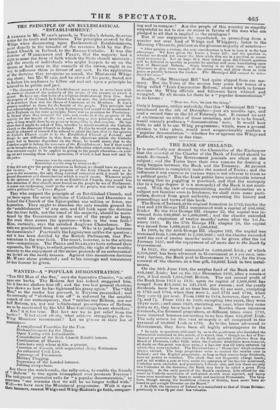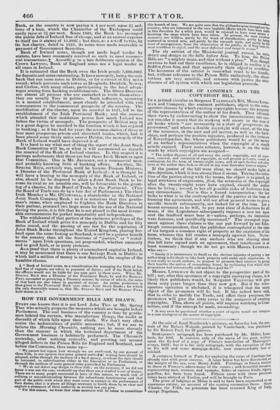THE BANK OF IRELAND.
IT is manifestly not desired by the Chancellor of the Exchequer that the renewal of the Charter of the Bank of Ireland should be much discussed. The Government journals are silent on the subject ; and the Tories have their own reasons for desiring a snug bargain between the Beek and the Treasury. At present the institution is completely under the control of Tories ; and the influence it can exercise in various ways is not adverse to them as a political party.* But the Irish public have considerable interest in seeing that no juggling is practised, and that the monopoly
(for in a large degree it is a monopoly) of the Batik is not conti- nued. With the view of communicating useful information on a subject not familiar even to Irishmen, we shall state some parti- culars, derived from good authority, respecting the history and proceedings and views of this bank.
The Bank of Ireland, at its original formation in 1782, (under the 21st and 22d George III.) commenced with a capital of 600,0001. Irishst- By the 31st George III. chapter 22, the capital was in- creased from 600,000!. to 1,000,0001.; and the charter extended until the expiration of twelve months' notice after the 1st Ja- nuary 1816. By the 37th George III. chapter 50, the capital was raised from 1,000,000/. to 1,500,0001.
In 1808, by the 48th George 111. chapter 103, the capital was increased from 1,500,000/. to 2,500,0001.; and the charter extended until the end of twelve months' notice to be given after the 1st January 1837, and the repayment of all sums due to the Bank by Government.
In 1821, the capital amounted to 3,000,000/. Irish ; of which 2,850,000/. has been advanced to Government at 4 per cent. inte- rest; further, the Bank paid to Government in 1791, for the then renewal of the charter, as a free gift, 60,0001. Irish in two instal- ments.
On the 30th June 1808, the surplus fund of the Bank stood at 489,500/. Irish; but on the 31st December 1836, after a constant rise, it had reach 1,053,100/. British. The net annual profit of the Bank from 1833 to 1836, upon its capital of 3,000,000/. has ranged from 251,826/. to 241,1831. per annum ; and the yearly dividends have been at no time less than 61 per cent., excepting in 1783 and 1784, when they were 5, and 1792 and 1798, when they mere* per cent. From 1800 to 1814, however, they were 7, 74, and 71. From 1814 to 1829, excepting two years, they were 10 rer cent.; and since 1829, excepting one year, when they came down to 81, they have been 9 per cent. Besides these immense dividends, the favoured proprietors, at different times since 1793, have received bonuses amounting to no less than 655,0001. Irish. The only return for this vast monopoly- is all comprised in the payment of 60,000/. It ish in 1791. As to the loans advanced to Government, they have been all highly advantageous to the • In reply to questions addressed by us to the gentleman who furnished the information contained in this article, it is stated, that " though no Act of Par- liament or provision in the charter of the Bank excluded Catholics from the Board of Directors, (after 1829, when the Catholic disabilities were removed, all doubt on this point was done away,) a bye-law was till lately enforced, by which they were excluded. The Directors have which isahnorm always carried. The large proprietors unite to control the smaller ones is Ireland ; and the English proprietary, as long as they receive large dividends, have no motive to interfere. The stock does not frequently change hands; and as till within a year or two, ler the operation of the bye-law mentioned, Catholics were excluded, and practically Liberals also, and now there are only two Catholics in the direction, the Bank may fairly be called a great Tory monopoly. In the early period of the Bank's existence, bills offered far dis- count by Catholic merchants of undoubted wealth were rejected, and heavy losses were occasioned by loans to needy and insolvent Protestants. The Qua.- leers, though among the wealthiest citizens of Dublin, have never been al- lowed to put &single Director on the Board." t In 1828, the currency of Ireland was assimilated to that of Great Britain: previously it was 86 per cent. less valuable. Bank, as the country is now paying it 4 per cent. upon 24 mil- lions of a loan, which the Chancellor of the Exchequer could easily raise at 3; per cent. Since 1808, the Bank has managed the public debt of Ireland free of charge, and at an annual expense to itself (as it states) of 15,0001.; but then, as a set-off to this, by its last charter, dated in 1821, its notes were made receivable in payment of Government Securities.
Bank of Ireland notes, though not made legal tender by statute, have been commonly received as such in most commer- cial transactions.: According to a late deliberate opinion of the Crown Lawyers, Bank of England notes are a legal tender in all cases in Ireland.
It is estimated that the Bank owes the Irish people 7,000,0001. for deposits and notes outstanding. It has a monopoly, being the only bank that can issue notes in Dublin, or for a circuit of fitly miles round; which prevents such towns as Drogheda, Dundalk, Newry, and Carlow, with many others, participating in the local advan- tages arising from banking establishments. The fifteen Directors are almost all persons who are embarked in trade themselves : they are usually Tory in politics. Such influences, operating in a monied establishment, must clearly be attended with evil consequences to the commercial prosperity of the country. The modification of the charter, upon its renewal in 1821, led to the establishment of the Irish Provincial Bank ; and the success which attended that institution proves how much Ireland was before the victim of monopoly. The prosperity of Belfast may in in a great degree be ascribed to the freedom which it has enjoyed in banking ; as it has had for years the accommodation of three or four most prosperous private and sharehold banks, which, had it been placed some thirty miles nearer Dublin, the monopoly of the Bank of Ireland would have deprived it of.
It is hard to say what sort of thing the report of the Joint Stock Bank Committee will be, or what it will recommend as regards the renewal of the Bank of Ireland charter. In this respect it is
perhaps unfortunate that there are but three Irish Members upon that Committee. One is Mr. JEPHSON, not a commercial man,
and probably knowing little of banking affairs. Another, Mr.
SPRING RICE, certainly was, until he became Finance Minister, a Director of the Provincial Bank of Ireland : it is thought lie
will have a leaning to the monopoly of the Bank of Ireland, or else, should lie be disposed to allow a Joint Stuck Bank to be- come its rival as an issuable one, will be favourable to the grant- ing of a charter, by the Board of Trade, to the Provincial. • (This the Board of Trade can do by a late Act of Parliament.) The third Irish Member is Mr. O'CoNsraxt, a shareholder in the National
Joint Stock Company Batik : as it is notorious that this gentle- man's name, when employed to frighten the Bank Directors in their parlour, procured two large sums for the use of the National during the panic, it is felt that he is not placed in the most favour- able circumstances for perfect impartiality and independence.
The withdrawal of that portion of the exclusive privileges of the Bank of Ireland which gives it a monopoly in Dublin and for fifty miles round, and the passing of one law for the regulation of Joint Stock Banks throughout the United Kingdom, placing Ire- land upon the same footing as Scotland, would be a greater benefit to the country than all the fractions of "justice," or " instal- ments " upon Irish questions, yet propounded, whether earnestly and in good faith, or in party pretence.
As a proof that there is plenty of unemployed capital in Ireland, it may be mentioned that there is one Savings Bank in Dublin in which half a million of money is now deposited, the surplus of the bumbler classes.
" Bank of Ireland notes, as a consideration for managing the Debt of Ire. land free of expense, are taken in payment of duties; and if the Bank failed, the officers would not be liable for any sum paid in those notes. When Mr. SPRING Rice was a Director of the Provincial Bank, he and Sir ROBERT Pert. succeeded in procuring a Treasury minute, by virtue of which, the notes of that bank are also taken in payment of duties. An undue preference is thus given to the Provincial Bank over other Joint Stock Banks; for which the only discernible reason is, that Sir. SPRING RICE and Sir ROBERT PEEL bold shares in it."



























 Previous page
Previous page